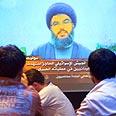
Arab media watch: Where is al-Manar?
How is Hizbullah TV station being managed? London-based newspaper al-Sharq al-Awsat tries to locate center of operations. This week in Arab press: Criticism of Hizbullah, accusations against Syria and purported Israeli spy ring exposed in Lebanon
The mystery behind al-Manar: According to a report in the London-based newspaper al-Sharq al-Awsat, no one knows where Hizbullah television station al-Manar is being broadcast from since it went underground after Israeli attacks.
Apparently not even guests interviewed on al-Manar programs know where the headquarters are, “in keeping with complicated regulations which prevent them from knowing the precise location,” the pan-Arab newspaper reports.
Phone calls to the station are not a simple matter either, as all its employees have changed their phone numbers. Therefore, the newspaper reports, to reach senior al-Manar employees by phone, one must pass through a complex chain of communications, mostly cellular. Thus, the location from which Hizbullah TV broadcasts remains a riddle even to some of its employees, and broadcasts are done from numerous locations to maintain secrecy.
A spokesman for the station, Ibrahim Farkhat, said al-Manar had prepared protocol for broadcasting during emergency situations. He noted the station was in a “terrific” state, despite the “difficult circumstances on the ground.” Al-Manar’s broadcasts were somewhat disrupted, however, by Israeli Air Force strikes on the station, which can be felt in its simplified broadcast schedule and hasty and meager news reports.
Spy games: In the meantime, reports continue regarding the exposure of an Israeli spy network by Lebanese intelligence.
Lebanese journal al-Intiqad on Friday reported that a group of Israeli operatives were caught with communications equipment used to track cell phone conversations.
The operatives arrested are citizens of various countries, the report claimed, including Lebanese, Iraqi, Palestinian, Syrian, Sudanese, Egyptian and others. Among other things, their operations allowed Israeli intelligence to track certain targets, such as particular cars.
‘Hizbullah feared Lebanese prosperity’: The Arab media also included some voices of criticism against Hizbullah. Huda al-Husseini, a columnist in al-Sharq al-Awsat, wrote an article this week under the headline: “Bombing of Haifa led to ruin of Lebanon.”
“Before the order to kidnap the two Israeli soldiers, the Lebanese economy had started to lift its head, investments were streaming in, real estate prices rose, and prosperity could be felt in every corner. But all of this recovery constituted a challenge to the Hizbullah thought processes. Lebanese people of all ethnicities were beginning to return to their state before the war and before the invasion of the idea of the Iranian Islamic revolution. Lebanese like to earn and live well, and this very much threatened the outlook Hizbullah is based on,” al-Husseini wrote.
“Hizbullah's preparation for this war began years ago. The organization trained and stocked up on weapons from Iran and Syria,” she wrote, adding that Israel served Lebanon true destructive blows only after Hizbullah attacked Haifa.
Al-Husseini criticized the words of a Hizbullah minister, who said: “We’ve exchanged the period of tourism for the period of heroism,” saying: “These are nice words, but what is really needed is a brave initiative to save Lebanon, for example, for Hizbullah to declare a unilateral ceasefire.”
Syria’s gains: Some, on the other hand, allude to accusations against Syria for the current crisis, in their failure to agree to draw borders in which the Shebaa Farms belong to Lebanon and not Syria, to justify Lebanon’s demands that Israel withdraw from them.
Lebanese Information Minister Ghazi Aridi claimed in an interview for al-Sharq al-Awsat that “If Syria agreed to draw the border, we could go to the UN Security Council as a strong step and work to achieve our demands. If Israel then refused to withdraw from Shebaa Farms, Hizbullah resistance could fulfill its duty by being supported unanimously in Lebanon and having international legitimacy. But Syria refused and here comes Israel instead supported by international legitimacy and opens its aggressions.”










